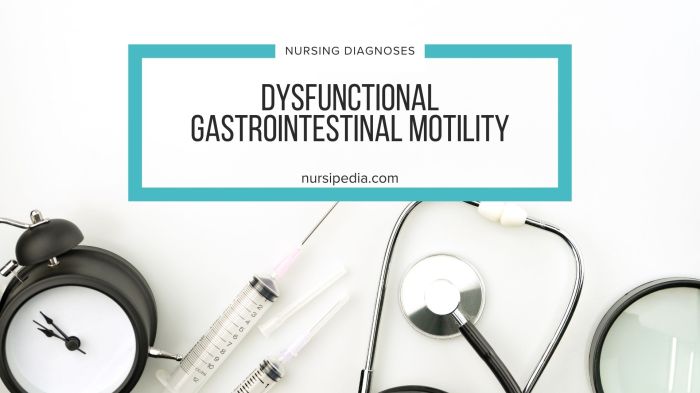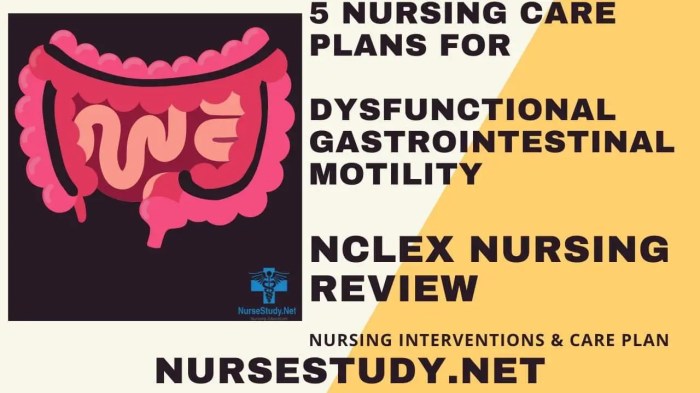The nursing care plan for dysfunctional gastrointestinal motility Artikels a structured approach to managing this condition, which affects the normal functioning of the digestive system. This plan encompasses assessment, diagnosis, intervention, and evaluation, with a focus on improving patient outcomes and quality of life.
Dysfunctional gastrointestinal motility can manifest in various symptoms, including abdominal pain, bloating, constipation, diarrhea, and nausea. Understanding the underlying causes and symptoms is crucial for developing an effective nursing care plan.
Dysfunctional Gastrointestinal Motility: Nursing Care Plan For Dysfunctional Gastrointestinal Motility

Dysfunctional gastrointestinal motility is a condition that affects the normal movement of food through the gastrointestinal (GI) tract. This can lead to a variety of symptoms, including abdominal pain, bloating, constipation, and diarrhea.
The GI tract is a complex system of organs that work together to digest food and absorb nutrients. The muscles in the GI tract contract and relax to move food through the system. Dysfunctional gastrointestinal motility occurs when these muscles do not work properly.
Causes and Symptoms, Nursing care plan for dysfunctional gastrointestinal motility
There are many different causes of dysfunctional gastrointestinal motility. Some of the most common causes include:
- Diabetes
- Parkinson’s disease
- Multiple sclerosis
- Stroke
- Trauma
- Medications
The symptoms of dysfunctional gastrointestinal motility can vary depending on the cause of the condition. Some of the most common symptoms include:
- Abdominal pain
- Bloating
- Constipation
- Diarrhea
- Nausea
- Vomiting
Nursing Assessment
The nursing assessment for a patient with dysfunctional gastrointestinal motility includes a physical examination, history taking, and diagnostic tests.
Physical Examination
The physical examination should focus on the abdomen. The nurse should assess for abdominal pain, bloating, and distension. The nurse should also auscultate the abdomen for bowel sounds.
History Taking
The nurse should obtain a detailed history from the patient. The history should include information about the patient’s symptoms, medical history, and current medications.
Diagnostic Tests
The nurse may order a variety of diagnostic tests to help diagnose dysfunctional gastrointestinal motility. These tests may include:
- Upper endoscopy
- Lower endoscopy
- Colonoscopy
- Barium swallow
- Manometry
Nursing Care Plan
The nursing care plan for a patient with dysfunctional gastrointestinal motility should focus on managing the patient’s symptoms and preventing complications.
Goals
The goals of the nursing care plan include:
- Relieving the patient’s symptoms
- Preventing complications
- Educating the patient about their condition
Interventions
The nurse may implement a variety of interventions to achieve the goals of the nursing care plan. These interventions may include:
- Administering medications
- Providing dietary counseling
- Teaching the patient about stress management techniques
- Assisting the patient with bowel movements
Evaluations
The nurse should evaluate the patient’s response to the nursing interventions on a regular basis. The nurse should assess the patient’s symptoms, monitor the patient’s bowel movements, and provide support and education to the patient.
Patient Education
Patient education is an important part of the nursing care plan for a patient with dysfunctional gastrointestinal motility. The nurse should educate the patient about their condition, the treatment plan, and the importance of following the treatment plan.
The nurse should also provide the patient with information about diet, lifestyle, and medications. The nurse should encourage the patient to eat a healthy diet, get regular exercise, and avoid stress.
Evaluation
The evaluation of a nursing care plan for dysfunctional gastrointestinal motility should focus on the patient’s outcomes. The nurse should assess the patient’s symptoms, monitor the patient’s bowel movements, and provide support and education to the patient.
The nurse should also make recommendations for future care. These recommendations may include:
- Continuing the patient’s medication regimen
- Following the patient’s diet and exercise plan
- Managing stress
- Seeing the doctor for regular follow-up appointments
Query Resolution
What are the common causes of dysfunctional gastrointestinal motility?
Dysfunctional gastrointestinal motility can result from various factors, including neurological disorders, hormonal imbalances, medications, and certain medical conditions.
How is dysfunctional gastrointestinal motility diagnosed?
Diagnosis involves a thorough medical history, physical examination, and diagnostic tests such as endoscopy, colonoscopy, and motility studies.
What are the goals of nursing care for dysfunctional gastrointestinal motility?
Nursing care aims to relieve symptoms, prevent complications, promote digestive function, and enhance patient education and self-management.


